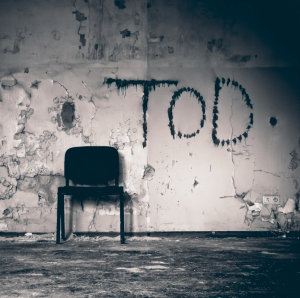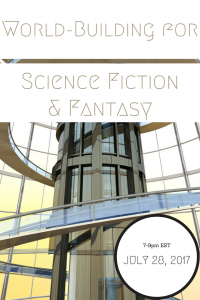On Friday, we explored how shame is the beating heart of great fiction, how probing the shadow sides of human nature is what can separate the mundane from the magnificent.
All fiction has its place. Some fiction is purely fun and escape and the world needs more fun and feel good. Certain books are simply a holodeck to get away from the mundanities of life, the overwhelming pressures of being an adult (kids, laundry, bills, car repairs). They serve as a place of rest and we all could use more of that!
But that isn’t all fiction.
Many writers (myself included) desire to go far deeper with our fiction, explore wounds and human issues, poke and prod at larger social dilemmas using the narrative form to expose that which is diseased and show it can be overcome. Speculative fiction is an excellent outlet for this. This genre offers a myriad of ways to help us mere humans face all the stuff we fear the most.
I am breaking out of my comfort zone and now offering new classes specifically for the genres I love and read the most. In August I have a class on Speculative Fiction and one on Character-Driven Stories (which includes but is not limited to literary fiction and can greatly enhance genre fiction) before I leave for New Zealand to keynote.
Why did I pick these two to start with? These are my favorite kinds of books to read, which means I’ve read a lot of these kinds of stories. I also find it fascinating how (believe it or not) great speculative fiction has a lot more in common with literary than one might believe.
What is Speculative Fiction?
Speculative fiction is an umbrella term used to describe narrative fiction with supernatural or futuristic elements. This includes but it not necessarily limited to fantasy, science fiction, horror, utopian, dystopian, alternate history, apocalyptic fiction, post-apocalyptic fiction.
Basically, all the weird stuff.
(And forgive me because today we are using seriously broad strokes.)
But what makes the difference between the laughable 1950s science fiction matinees and the long-forgotten pulp fiction versus the works of Philip K.Dick? What makes The Road literature even though it’s a post-apocalyptic novella? Why is Heart-Shaped Box or Wool so deeply disturbing and simultaneously resonant?
Why do star-packed big-budget films like Jupiter Ascending fizzle? Yet Blade Runner is a science fiction staple worthy of being remade for the newest generations to enjoy?
Plot
It’s easy to dismiss speculative fiction as escapist fluff and some of it is. But, when we look to the great speculative fiction, we see the authors are disguising explosive social commentary within narrative so it can be viewed and experienced behind the safety-glass/containment field of story.
By using story, we writers place the reader into this world then (hopefully) generate empathy that is impossible to create any other way. I’ve seen the movie I, Robot countless times and I bawl EVERY time during this scene.
Yeah this is me…
Stepford Wives was a commentary on the women’s liberation movement. Animal Farm was a treatise on socialism and the dangers of groupthink. The peril that comes with handing over too much power to those who claim to have noble and benevolent intentions without asking the hard questions.
Brave New World was Huxley’s stab at a culture propelled by temporary highs, unlimited choices and instant gratification while rejecting that which endured (love, family, marriage), because that which lasted required time, sacrifice and work. He showed us an eerily accurate picture of what society could become if we were not vigilant…and is now probably rolling in his grave.
*Makes note to write story about Huxley haunting Instagram*
Do Androids Dream of Electric Sheep? was Philip K. Dick’s commentary on artificial intelligence and just because we can play God, should we? What sort of moral implications are involved? These are issues we are now facing for real, that are no longer fiction and we are being tasked with the tough questions.
Is it wise to create and sell sex robots that come with a “frigid” setting? What happens when we extend the logic of this? Blade Runner. We get Blade Runner. Also a bizarre escalation/reinvention of the previously mentioned Stepford Wives.
All these great science breakthroughs that float across our newsfeed are now fertile ground for new and possibly even better stories that prod the science with ethical dilemmas.
We show the world it’s upside down and maybe even ways to right it.
I believe that the great speculative fiction writers have always been the conscience of culture, the voice that whispers things like, “Just because we can, doesn’t mean we should.” Or, “This really is a big deal and can go ugly really easily.”
Horror does a lot of that as well. Good horror writers tap into the subconscious angst and gives it a face. What happens when society is allowed to continue to devalue human life? When mobs are handed permission to call the shots? Let’s chat about this after watching The Purge.
To Make it BIGGER, Make it Smaller
When we care about everything, we care about nothing. Additionally, the human mind can’t truly grasp the loss of a billion lives. It doesn’t resonate because it can’t compute.
Thus the great spec-fic plots make the big small. We tell a small story of one person or a group of people as it plays out on the far larger stage. World War Z anyone?
This is why so many Hollywood movies about asteroids hitting the planet fizzle while The Road simply guts us.
Not All Big Stories are Big
Sometimes speculative fiction isn’t addressing something big, rather it dives into the intimate and deeply personal. Heart-Shaped Box is about a vengeful ghost out to destroy an aging rock star and anyone he loves. While the supernatural elements are terrifying, what is so beautiful and moving about this story is how the characters are forced to face and conquer inner demons they would have been happy to bury if not running for their lives.
The human story is what elevates this from a forgettable scary book into a work that prods at the deep dark places of the characters (and by extension the reader).
Character
Writing speculative fiction is really tough. It has a lot in common with literary in that it can turn preachy or fall flat so easily. Too many writers get fixated on world-building, when world-building is backdrop and can never substitute for story.
Spec-fic is tough and I swear it is the souffle of fiction. If we aren’t careful and look away one second? Yeah.
Plot of course matters in that we need a core story problem to drive the story, but characters are vastly important (possibly even more important). We must develop multi-dimensional characters with flaws and problems to set on this adventure because gizmos, gadgets, spaceships, magic, chainsaws, gore and ghosts alone are not a story.
We don’t need a bigger asteroid…we need a better story. Story is what is going to rattle the cage, not the two-ton spider. More blood or teeth won’t scare us and won’t change us.
In a world where we are overwhelmed with doom and gloom, where any debate on-line easily devolves into ranting, I think spec-fic is more important than ever in human history. Story is the place where the armor goes off and the heart is exposed and then able to be changed, fixed, remolded, and softened.
What are your thoughts? Do you love horror? Dystopian? Science fiction? What are your favorites? I LOVE HEARING FROM YOU! What makes spec-fic great? Or fall flat? What are your pet peeves?
I love speculative fiction, even though it took about 4 years to figure out what other writers meant by “speculative fiction.” I am a horror and science fiction JUNKIE. And I love the good stuff, the stories that poke and prod and that people can’t help talking about, debating, discussing in a way no Facebook rant-fest can. Which, again, is why I am thrilled to be offering a new class on it!
****And MAKE SURE to check out the classes below and sign up! Summer school! YAY! We’ve added in classes on erotica/high heat romance, fantasy, how to write strong female characters and MORE! So scroll down and sign up!


















26 comments
6 pings
Skip to comment form
Lightbulb. I finally understand speculative fiction. And you peeled back the layers to take it even deeper. This was a GREAT read. Thank you!
I’m writing my first dystopian series now. I think people think about the apocalypse now because they’re so worried about the state of the world right now.
I can’t with most speculative fiction. My anxiety is high enough as it is. Brave New World had me in a fetal position. I can do scifi and fantasy, though I haven’t in a while. I do like horror. I’m okay with mind-chilling fear. I can’t deal with Animal Farm.
I love speculative fiction, although dystopian stories and horror are not generally my cup of tea. So much in this world seems dystopic or horrific already.
Nice to hear you’re coming to New Zealand! Just Auckland & Rotorua, or are you venturing further south?
Author
Rotorua. Excited!
I never knew that all of those books I’ve enjoyed were speculative fiction 🙂
Thanks for outlining this- and you make a great case for its importance.
Out of curiosity, are you talking about World War Z the book (loved it!) or the movie (didn’t bother to see after I heard it was so different from the book 🙂
I’ve lurked around your blog a lot in the past, but this is the first time you’ve spoken to /my/ heart. I don’t enjoy horror, but I’ve loved science fiction since I first encountered it in the early 70’s. When done right, sci-fi illuminates the human condition because it reveals us, reacting to extreme situations and either overcoming them, or being destroyed by them. Thank you, thank you, thank you. 🙂
“Get Out” is probably my favorite recent horror film.
That picture of the woman hanging upside-down in the green kitchen, where is that from? Looks creepy…
These are not my genre preferences.
I admit. I’m all for unicorn fart and fairy wing escapism. I want to know I’m getting a HEA. I will even read the end of a book first to make sure I’m getting it before investing the hours in an unknown author.
Still, I get the power of the story and how it can transform. Educate without the audience realizing it. Make them think and question.
Assuming they aren’t distracted by something else.
Your last two posts have been wonderful! I’m a huge fan of horror and I enjoy it for most of the same reasons I love romance. I like a HEA or HFN and I like knowing the bad guy is going to get it in the end. (I realize this doesn’t always happen in horror, but it generally does.)
Also, I loved Cormac McCarthy’s The Road and I know it has its detractors, but it just spoke to me. Dick’s work, too. Happy to see them mentioned.
I finally concluded my WIP is attempting spec fic (if not literary…), oh, dear. Shoot. But I do have the letters after my name and, well, expectations. Can be paralyzing.
But anyway, no supernatural, no horror, just. . .well, the Handmaid’s Tale could be called horror, on a certain level? I just have to translate the “scariness” in my alt-earth story (lamenting the loss of literacy…) into something more tangible.
In other words, going back to focus on my individual characters’ paths–the part I secretly love best, anyway!
That scene makes me cry too! It’s wonderful to have an article to reference for when someone puts down my favorite genre (or I find myself downplaying what I love in favor of the literary genre).
I love sci-fi and dystopian. I agree with your conclusion that it is not about the tech and SFX, but about the human condition revealed in relation to the tech. I am revising a near-future novel I wrote a few years ago and re-writing the prequel to it because of the “future shock” effect — the speed of real-world change and tech development so quickly overtakes the speculative!
That’s true: some of my all-time favorite sci-fi has been 20-minutes-into-the-future stuff–and try explaining to the young’uns how brilliant it is. “So it didn’t end up happening like that? Thank a writer!”
On the other hand, one can easily transpose something amazing like Bradbury’s Fahrenheit 451 to current threats: disguising reality TV as entertainment looks a lot like the viewers who need stories all about them, no artifice appreciated anymore.
What do you get when you cross literary with Sci-fi with added heaps of dry humor? You get everything Kurt Vonnegut ever wrote. You young ones need to read him if you haven’t.
Hi Kristen. Very interesting Post! I, would include Fantasy? Would you? The book and movie that made the most impact on me growing up was ‘The Neverending Story’. To this day I remember every line, every character and the way it has comforted and validated my intention as I have lived my life through various means to help others. My dream was and remains being able to write like this and possibly be able to inspire others. If you have time let me know if in your mind you also include this type of Fantasy Story in the grouping of Speculative Fiction and then I will know whether to sign up for this particular class. Thanks again.
Author
Fantasy is technically included, but it has its own genre. So you see some cross-pollination but depends on the fantasy. I would just say “Neverending Story” is fantasy like LOTR. Of course, this is why I am teaching the “literary” class because fantasy can be just fun pulp fiction or it can have the depth an layering like we talked about here. That deep layering is what we will talk about in the spec class, so world-building doesn’t take over.
Thanks. I’m looking forward to taking your upcoming classes. Take care.
Author
You might also want to look into Cait’s Fantasy class.
Hi Kristen: Thanks.I just did. Looks very interesting. The Gold and Platinum (or silver option) talks about time with Cait to go over one’s work. I don’t have a work yet in progress for this genre. Could the consultation time be used to help me figure out how to begin a Story in this genre? I don’t have Cait’s email so I’m asking through you. Thanks.
Love the post. I’ve been in love with all aspects of SciFi and Fantasy since I was a kid for exactly the reasons you mentioned. What a great way for authors to extrapolate current social commentary to show what might happen if we follow that particular path.
Hard to write? Nah. I *love* to write spec-fic. What if somebody puts a toilet in the living room? What if there were a Gated Community for hobbies, like for LARP’ers? What if someone wanted to play baseball on the moon? What if a ballet star went comatose and sleep-danced? What if, what if, what if… Now I find *hard* sf a pain if not downright impossible to write, so I almost never do that one.
Interesting piece. I’m thinking that Katniss from the Hunger Games and the main characters Tobias and Triss from the much better books (than movies) in Divurgent, both fit into this speculative fiction, within YA fiction. In some sense doesn’t Tolkien even in LOTR. Though the characters are many races and diverse, what happens when evil is allowed to flourish? When we do evil to get want we want the most the most, even though it’s bad for us. Such as Gollum and many other characters who could’ve taken the ring from Frodo bur overcame their desire for power? It’s an interesting thought most definitely ‘The Handmaid’s Tale’ by Atwood and 1984 fit in here.
https://mandibelle16.wordpress.com/2017/07/28/friday-music-sunday-photo-fiction-ship-to-the-stairway-flashfiction-musicchallenge/
I personally love dystopian fiction and the moral questions explored within. Any sign of preachiness and I’m out. I want to allow the reader to make up their mind, even if their conclusion differs widly from mine. I won’t even mind if they hate the story, as long as it got a reaction from them. I’m currently remoulding my story ideas for a detective who lives in a dystopian world and is actually involved in crime herself. Looking forward to seeing the story grow from my copious notes.
Thank you for clarifying what speculative fiction is. I had no idea I was a speculative fiction fan. Well, except for horror. Can’t handle that genre.
I’m obsessed with Wool and I even enjoy a lot of the short story fan fiction based on Wool. I love dystopian. Hunger Games and Divergent (as mentioned above in a comment) are two of my faves. I’ve been a sci-fi fan since I was a kid. I think time travel tales are my all time favorites. One of the WANAs, Jennette Marie Powell, has a time travel romance series, The Saturn Society. Romance isn’t my favorite genre, but it works great in this series. It intrigues me, and her writing style just pulls me in. It’s a series that I enjoy rereading. Same with Wool. And Susan Kaye Quinn’s Mind Jack series is a YA series that I’ve read more than a couple times.
I lov show you’re able to break stories down and pinpoint exactly what works and what doesn’t. Go Kristen!
I’ve always been a writer (and of course reader) of speculative fiction, though recently I moved my writing from high fantasy to dieselpunk.
It has always saddened me how people (yes, even many readers) dismiss speculative fiction as somethig unrealistic and (especially in the case of fantasy) more suitable for children because it is ‘easier’.
You know? It is ‘easier’ if you take it superficially, I mean, what’s easier than doing what every you damn want? But when you really want to explore the possibilities of the genre (or genres included in the definition) it becomes very difficult. You have to be very realistic while using unrealistic elements. As Tolkine would say, you have to convince the reader that the sun is of course green.
I won’t say this is easy, but I’ll say that if we can do this, then speculative fiction, in all its incarnation, is a powerful form of storytelling, because it can address even very touchy matters in a way that is acceptable to readers and so more likely to touch them.
I’ve always believed that the power of speculative fiction is to show the truth through a mask… and as Oscar Wilde said, give a man a mask, and he will tell you the entire truth.
[…] Read the rest of this post HERE. […]
[…] Darren Croucher suggests 8 female-penned YA science fiction novels, while Kristen Lamb analyzes why speculative fiction matters. If you prefer something shorter, Louis Menand asks can poetry change your life? What do you […]
[…] we brushed the surface of speculative fiction and why it can be such a powerful and world-changing genre when executed well. In my opinion (based on years of experience with new manuscripts) this genre […]
[…] we brushed the surface of speculative fiction and why it can be such a powerful and world-changing genre when executed well. In my opinion (based on years of experience with new manuscripts) this genre […]
[…] Fiction, Horror & More – Why Speculative Fiction Matters https://authorkristenlamb.com/2017/07/science-fiction-horror-more-why-speculative-fiction-matters/ As a confirmed fan of speculative fiction, I was interested to see what Kristen Lamb had to say on […]
[…] elbow-deep washing dishes. In an age of texting, wifi, virtual reality, and self-driving cars, humans are now faced with all those sticky moral questions posited by the original science fiction authors over a century […]